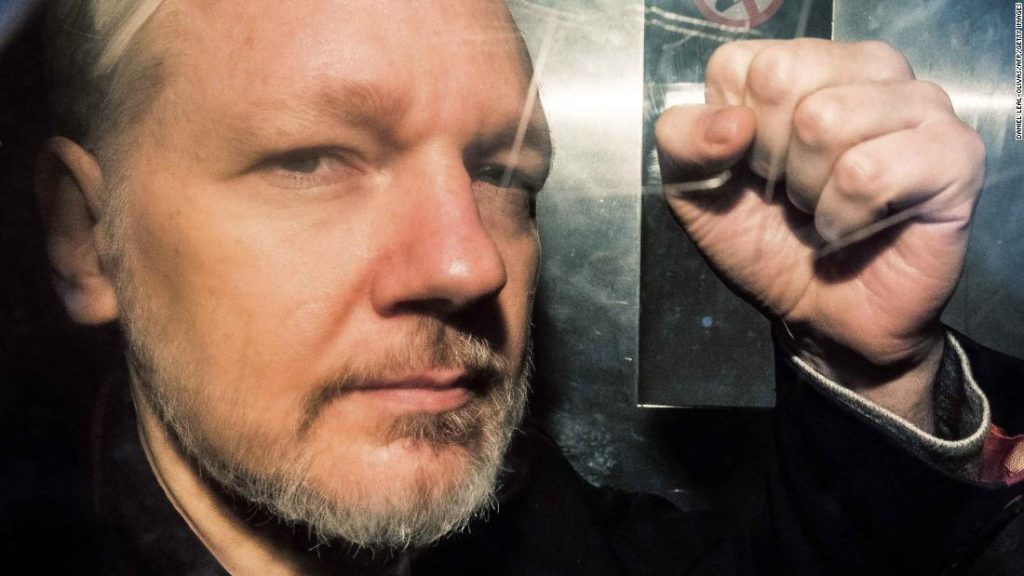The 49-year-old Australian has been charged in the US under the Espionage Act for his role in publishing classified military and diplomatic cables.
“I have decided that extradition would be oppressive and I order his discharge,” judge Vanessa Baraitser said in her ruling Monday.
Despite ruling that Assange would be afforded a “fair trial” in the event of extradition to the United States, the judge considered that the “special administrative measures” Assange would most likely be held in would have a severe, negative impact on his mental health.
“I find that the mental condition of Mr. Assange is such that it would be oppressive to extradite him to the United States of America,” she added.
A tightly-packed crowd of supporters celebrated the news outside the Old Bailey in London on Monday, shouting: “Free, free, free, Assange!”
The US said it would appeal against the decision and asked for the WikiLeaks founder to be remanded in custody while that process was ongoing.
The judge will consider a bail application from Assange’s legal team on Wednesday afternoon.
Assange’s lawyers and supporters have argued that the extradition order against him is politically motivated, and that, if carried out, it would have a chilling effect on press freedoms in both the US and the UK.
Speaking outside court on Monday Rebecca Vincent, director of international campaigns for Reporters Without Borders (RSF), said the group welcomed the judge’s decision that Assange would not be extradited because of his serious mental health issues, but that they were very concerned about the “substance of the decision.”
In April 2019, the US charged Assange with “conspiracy to commit computer intrusion,” a charge that carries a maximum sentence of five years. In May 2019, the federal government charged Assange with a further 17 counts under the Espionage Act for his role in publishing classified military and diplomatic cables.
Each of those counts carries a potential sentence of 10 years, meaning that if convicted, Assange could be sentenced to up to 175 years in jail.
Lawyers for the US government argued that by publishing the diplomatic cables in an unredacted form, Assange had put the lives of sources and informants in “immediate” danger, and damaged the capabilities of US forces carrying out operations abroad.
“Reporting or journalism is not a license for criminality,” James Lewis, Counsel for the US government told the court.
Julia Hall, Amnesty International’s expert on human rights in Europe said in a September 2020 statement that the implications of the extradition order could not be overstated.
Assange has been held in London’s HMP Belmarsh prison — one of the most secure facilities in England and Wales — since he was arrested by UK authorities in April 2019, after Ecuador revoked his right to political asylum.
Nils Melzer, the UN’s Special Rapporteur on torture, has previously said that Assange displays “extreme stress, chronic anxiety and intense psychological trauma” after being subjected to several years’ worth of “progressively severe forms of cruel, inhuman or degrading treatment.”
He added that Assange was subjected to “oppressive isolation, harassment and surveillance inside the embassy,” as well as “deliberate collective ridicule, insults and humiliation.”
Stella Moris, Assange’s partner and the mother of the couple’s two children, said in an editorial published in the UK’s Daily Mail newspaper on Saturday that Assange had “been acting in the same way as any other journalist would, in attempting to hold the powerful to account.”
“Julian embarrassed Washington and this is their revenge,” she said.
Moris has launched a Twitter campaign asking Trump to pardon Assange before he leaves office.
You may also like
-
UK coronavirus variant has been reported in 86 countries, WHO says
-
NASA technology can help save whale sharks says Australian marine biologist and ECOCEAN founder, Brad Norman
-
California Twentynine Palms: Explosives are missing from the nation’s largest Marine Corps base and an investigation is underway
-
Trump unhappy with his impeachment attorney’s performance, sources say
-
Lunar New Year 2021: Ushering in the Year of the Ox

